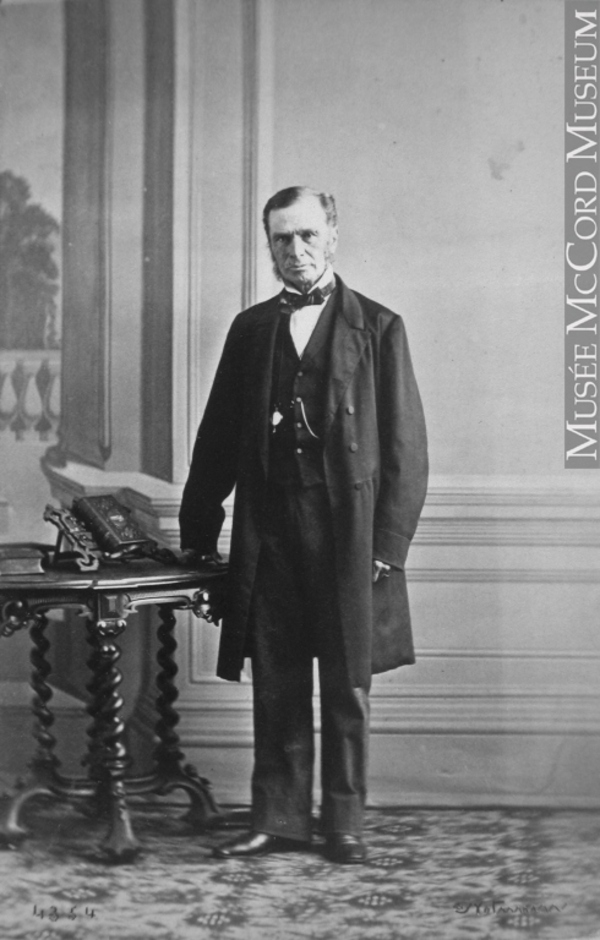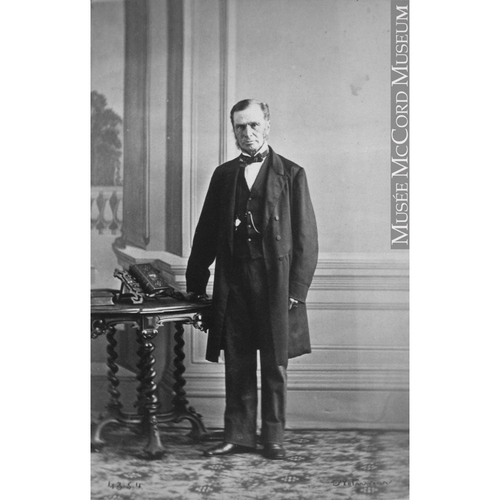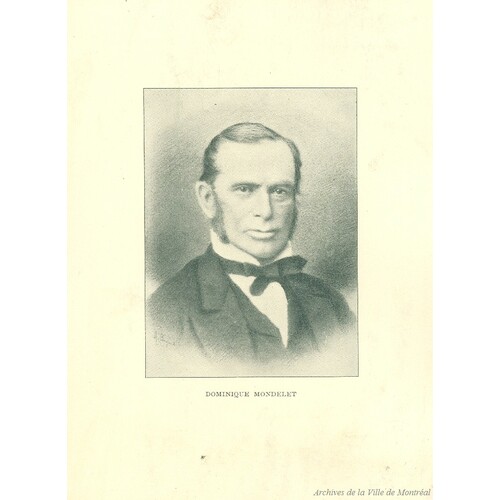
Source: Link
MONDELET, DOMINIQUE, lawyer, politician, judge, and seigneur; b. 23 Jan. 1799 in the parish of Saint-Marc on the Richelieu River, Lower Canada, son of Charlotte Boucher de Grosbois and Jean-Marie Mondelet*, notary, member of the assembly (1804–9), and coroner of Montreal; d. 19 Feb. 1863 at Trois-Rivières, Canada East.
Dominique Mondelet studied at the Collège de Montréal and then articled with the distinguished lawyer Michael O’Sullivan*. He was admitted to the bar of Lower Canada on 18 Aug. 1820, and won immediate professional recognition. He served on committees of the Advocates’ Library and Law Institute of Montreal and was elected its president in 1834; in November 1832 he was named kc. He also found time to translate Thomas Moore’s “Canadian Boat Song” into French. On 18 Feb. 1822 he had married in Montreal Harriet Munro, and they were to have eight children.
On 20 Nov. 1820 Mondelet was named major in the Pointe-Claire division of the militia, but seven years later lost his commission for opposing the militia policies of Governor Dalhousie [Ramsay*]. In 1828 he began active service on the Montreal Committee of Correspondence set up by prominent politicians to gather evidence for the imperial authorities substantiating Canadian complaints against Dalhousie’s administration. He co-authored the resolutions of 17 April chronicling Dalhousie’s persecution of magistrates and militia officers, which John Neilson*, Denis-Benjamin Viger, and Austin Cuvillier* later presented to the British House of Commons in the form of a petition.
In 1831, aided by his radical younger brother Charles*, who had entered his law office, and endorsed by the Patriote party, Dominique successfully contested the assembly seat for Montreal County as a moderate Reformer; during the election campaign he expressed faith in Britain’s new policy of conciliation. Mondelet insisted upon Lower Canada’s right to internal self-government, at the same time stressing that demands upon Britain should be made “energetically, but still with respect and moderation.” He also advocated educational and agricultural reforms, amendment of the road laws, appointment of an agent for Lower Canada in England, supervision of the notarial profession, and a better, cheaper, and faster administration of justice. Once elected, he immediately set to work, serving on 27 select committees, and assisting Frédéric-Auguste Quesnel to design a reformed judicial system.
A split between Mondelet and the Patriote party’s radical wing occurred in 1831, when he voted against the bill on fabriques [see Louis Bourdages*]. Another happened in 1832 when Dominique and Charles opposed the radical Dr Daniel Tracey* in the notorious “Massacre of Montreal” by-election, in which three of Tracey’s supporters were killed. Then in November 1832, when Dominique accepted a post as an honorary executive councillor without portfolio, the radicals reacted violently, arguing that like Philippe Panet*, another deputy appointed to the Executive Council, he would serve as the administration’s spokesman and spy in the assembly. Moderate Reformer John Neilson defended Mondelet’s entrance into the council as introducing an element of ministerial responsibility into Lower Canada, a view similar to one George-Étienne Cartier* would later, in the 1840s, hold as Louis-Hippolyte La Fontaine’s lieutenant. The radicals were adamant, however, and got Mondelet expelled from the assembly in a 32 to 27 vote. They referred to the expulsion of Robert Christie* as a precedent for their action, but the governor was unconvinced and sought an opinion on the legality of the assembly’s action.
Mondelet remained in the Executive Council, his constituency unrepresented in the assembly, until 1834 when his expulsion was declared illegal. His feud with the radicals deepened when Charles Mondelet publicly opposed the 92 Resolutions, and reached its culmination in La Fontaine’s bitter public attack on the Mondelets in Les deux girouettes, ou l’hypocrisie démasquée. This pamphlet appeared just before the general elections of 1834, and contributed to Dominique’s failure to muster enough support to present himself as a candidate.
In 1835, as “Un Avocat,” Mondelet defended himself and Charles with his Traité sur la politique coloniale du Bas-Canada . . . , aimed at Louis-Joseph Papineau* rather than his immature and excitable disciple La Fontaine. Mondelet warned against the organization of Patriote groups and the incendiary and anti-clerical articles in the popular press. He defended appointed legislative councils as institutions necessary to balance the rashness of popular assemblies, adding that, if these councils were made elective, they would merely represent the same interests as the assembly. As a radical youth he had supported elective councils, though advocating that their electoral basis be entirely different from that of assemblies.
Between printed sallies, Mondelet and Neilson cooperated in formulating policy. They were named commissioners to study American penitentiary systems with a view to establishing prisons in Lower Canada. In January 1835, in a comprehensive report in English, they listed relevant publications and documents concerning penitentiaries, building plans, estimates of construction and maintenance costs, and summaries of data from six northern states. There is no evidence to show how this report may have influenced penitentiary reform after the rebellion.
Politically, Mondelet remained unreconciled with the Patriotes. On 21 Dec. 1837 he was named among those to administer the general oath of allegiance, an unpopular function. In 1838 he was appointed to the hated Special Council, though he never attended a meeting or participated in its activities. From 10 May 1839, as deputy judge advocate, he prosecuted rebel prisoners, dealing severely with foreigners whose meddling in Lower Canadian affairs he deplored. He also came into direct professional conflict with his brother when he prosecuted prisoners whom Charles and his colleagues had defended in an earlier trial. This time the prisoners were sentenced to hang. Nonetheless, the two brothers continued to practise together, apparently unaffected by their clash in the courts.
On 15 June 1839 Mondelet temporarily replaced suspended Patriote sympathizer, Judge Joseph-Rémi Vallières* de Saint-Réal, on the Court of Queen’s Bench in Trois-Rivières. In 1842, after Vallières de Saint-Réal was vindicated and promoted, Mondelet replaced him permanently on the bench. Prior to leaving Montreal for Trois-Rivières, he had supervised the distribution of £2,000 voted by the assembly to provide temporary accommodations for people living with mental illness.
Mondelet’s first wife had died in childbirth during the traumatic year of 1837. A year later, on 12 Feb. 1838, he was married again, to Mary Woolrich, in Montreal. By 1842 only six of the 11 children born to his wives were still alive. For a time, however, death spared his family. In 1850 he was appointed to the Superior Court, still stationed in Trois-Rivières. That same year his eldest son was admitted to the bar, but another son in his teens died two years later. After years of “precarious health,” Mondelet died of a stroke on 19 Feb. 1863, and was buried in the cathedral. Conscientious and dedicated, he had attended court to the last, though on the 18th “his mind was not possessed of its customary clearness and precision.” Mondelet left vast and lucrative seigneurial holdings which he had inherited from his father in Saint-Michel-d’Yamaska (Yamaska) and Boucherville, together valued at over $55,000.
Dominique Mondelet’s personality was characterized by independence of spirit, a cautious reformist approach to government, and an orthodox religious conviction. Friends and opponents alike acknowledged his professional brilliance, for his skill in law, his erudition, and his remarkable fluency were outstanding even in the competitive legal circles of Montreal. His capacity for hard work and his temperate politics attracted the support of other moderates such as Quesnel and Neilson when his radical political opponents were charging him with office-seeking and misrepresenting his dislike of violence as treachery to the nation. Mondelet’s exclusion from the assembly was a great loss to the French Canadian people, and no less to be regretted because in the areas to which he subsequently turned he served with utmost integrity and conscientiousness despite the personal tragedies and disappointments he endured throughout his lifetime.
[The best sources for a study of Dominique Mondelet are at the PAC, MG 30, in the Audet papers, 21, pp.740–808, and in Audet’s Les députés de Montréal, pp.370–410. The selection of the Audet papers cited contains all Audet’s work notes for his biography in Les députés de Montréal: correspondence with archives, libraries, and private persons such as Mondelet’s grandson Charles-Dominique Gaudet; excerpts from parish registers, judicial archives, books, and articles, as well as the rough draft for his final study. An organized and extremely thorough historian, Audet has covered virtually all the available sources on Dominique Mondelet. His essay in Les députés, the final product, is as thorough and sympathetic a treatment of the subject as might be expected from the work notes. Audet’s own biases and views on the events of the 1830s are expounded as well in letters to Charles-Dominique Gaudet.
Another excellent source is La Fountaine’s Les deux girouettes, ou l’hypocrisie démasquée . . . (Montréal, 1834), since it is entirely devoted to attacking the Mondelet brothers and commenting on their political behaviour up until 1834. Dominique Mondelet’s own pamphlet, written under the pseudonym of Un avocat, Traité sur la politique coloniale du Bas-Canada, divisé en deux parties: opposition dans le gouvernement, licence de la presse, Conseil législatif par voie d’élection; réflexions sur l’état actuel du pays (Montréal, 1835), is also informative. Its 67 pages are devoted to attacking policies of Papineau and the Patriotes, and to expounding Mondelet’s own views on the political situation immediately prior to the rebellions. e.g.]
Archives paroissiales, Notre-Dame (Montréal), Registres des baptêmes, mariages et sépultures, 18 févr. 1822, 12 févr. 1838; Saint-Marc (Saint-Marc, Qué.), Registres des baptêmes, mariages et sépultures, 23 janv. 1799. Documents relating to constitutional history, 1819–28 (Doughty and Story), 506–19. Report of the state trials before a general court martial held at Montreal in 1838–9: exhibiting a complete history of the late rebellion in Lower Canada (2v., Montreal, 1839). Le Franco-Canadien (Saint-Jean, Qué.), 3 mars 1863. La Minerve, 21 févr. 1863. Quebec Daily Mercury, 23 Feb. 1863. F.-J. Audet, “Commissions d’avocats de la province de Québec, 1765 à 1849,” BRH, XXXIX (1933), 582. P.-G. Roy, Les juges de la prov. de Québec, 377. Story, Oxford companion, 531. G. Turcotte, Cons. législatif de Québec, 9.
Chapais, Hist. du Canada, III, 251; IV, 8–9. Christie, History of L.C., III, IV, V. Alfred Duclos de Celles, Lafontaine et son temps (Montréal, 1907), 12–13. Maurice Grenier, “La chambre d’Assemblée du Bas-Canada, 1815–1837” (thèse de ma, université de Montréal, 1966). Helen Taft Manning, The revolt of French Canada, 1800–1835: a chapter in the history of the British Commonwealth (Toronto, 1962), 346–47, 356–57. Mason Wade, The French Canadians, 1760–1967 (2nd ed., 2v., Toronto, 1968), I. F.-J. Audet, “Les Mondelet,” Cahiers des Dix, 3 (1938), 191–216. Gérard Malchelosse, “Généalogie de la famille Mondelet,” BRH, LI (1945), 54–55.
Revisions based on:
Bas-Canada, chambre d’Assemblée, Journaux, 1831–32. Bibliothèque et Arch. Nationales du Québec, Centre d’arch. de la Mauricie et du Centre-du-Québec (Trois-Rivières, Québec), CE401-S48, 24 févr. 1863; Centre d’arch. de Montréal, CE601-S51, 23 janv. 1837.
Cite This Article
Elizabeth Gibbs, “MONDELET, DOMINIQUE (1799-1863),” in Dictionary of Canadian Biography, vol. 9, University of Toronto/Université Laval, 2003–, accessed November 13, 2024, https://www.biographi.ca/en/bio/mondelet_dominique_1799_1863_9E.html.
The citation above shows the format for footnotes and endnotes according to the Chicago manual of style (16th edition). Information to be used in other citation formats:
| Permalink: | https://www.biographi.ca/en/bio/mondelet_dominique_1799_1863_9E.html |
| Author of Article: | Elizabeth Gibbs |
| Title of Article: | MONDELET, DOMINIQUE (1799-1863) |
| Publication Name: | Dictionary of Canadian Biography, vol. 9 |
| Publisher: | University of Toronto/Université Laval |
| Year of publication: | 1976 |
| Year of revision: | 2021 |
| Access Date: | November 13, 2024 |




